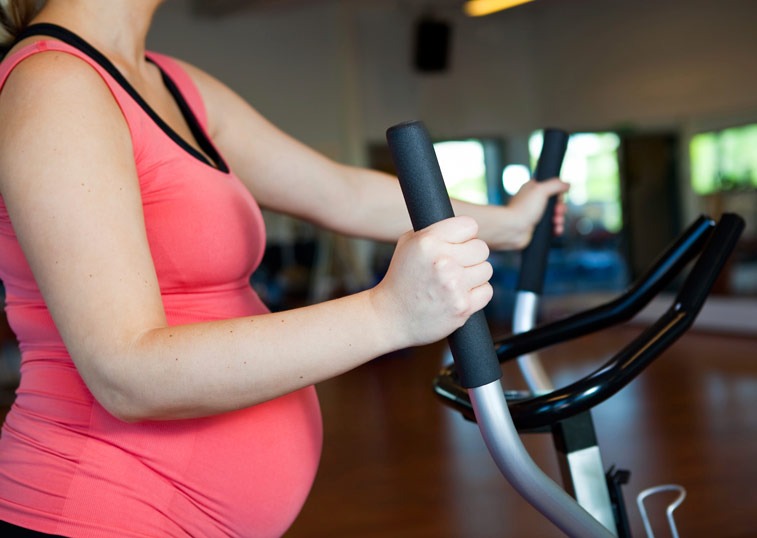The verdict is in. Regular exercise during pregnancy — with approval from your health care provider — can often help minimize physical discomforts and accelerate recovery after giving birth. Exercising can help you feel better, look better and sleep better. It also is a means of preparing your body for birth and helping get your prepregnancy body back more quickly. Despite this good news, a lot of myths are still circulating concerning exercise and pregnancy. Let’s take a look at five primary ones.
MYTH OR FACT
Every exercise is safe to do during pregnancy.
MYTH. Because pregnancy affects your balance after the fourth month, avoid exercises like biking, skiing or contact sports. Avoid exercises with potential for jarring, bouncing or risk of abdominal injury such as horseback riding. Many women enjoy dancing, swimming, water aerobics, yoga, Pilates, biking or walking. Try to enjoy a combination of exercises that include aerobics, strength training and flexibility.
Find a doctor: Sanford providers near you
MYTH OR FACT
Keep your heart rate under 130 while exercising.
MYTH. No particular “target” heart rate is right for every woman. If you can talk while you are exercising, your heart rate is OK.
MYTH OR FACT
It’s not safe to do abdominal work during pregnancy.
MYTH. Your abdominals and pelvic floor benefit from being strengthened during pregnancy. Stronger abs will aid in labor, delivery and recovery. Because exercising on your back after the first trimester can reduce blood flow to the uterus, avoid that after your first trimester. Instead, try standing or seated exercises that target ab muscles.
MYTH OR FACT
It’s dangerous to exercise during pregnancy if you didn’t prior to pregnancy.
MYTH. Being a couch potato is not better for you. Start slow with simple things like taking a short, daily walk. Work your way up to at least 30 minutes of moderate exercise five days a week. If you were inactive before pregnancy or you have medical or pregnancy complications, talk to your doctor before you begin.
MYTH OR FACT
Any sign of trouble – like spotting or pain – is a good reason to stop exercising and cease activity the remainder of the pregnancy.
MYTH. There are legitimate reasons to stop what you’re doing but most women can safely resume exercise. Call your doctor if you experience any of these warning signs: vaginal bleeding, unusual pain, dizziness or lightheadedness, unusual shortness of breath, racing heartbeat or chest pain, fluid leaking from your vagina, uterine contractions or calf swelling or pain.
What precautions should you take?
- Avoid vigorous exertion when it is hot and humid because pregnancy makes your body less efficient in exchanging heat.
- Don’t hold your breath while you are exerting yourself.
- Drink plenty of water before, during and after exercise to avoid overheating and dehydration.
- Skip exercising if you feel sick.
What benefits can you expect?
- Better energy level
- Backache relief
- Improved posture
- Less constipation
- Prevention of wear and tear on joints that become loosened during pregnancy due to hormonal changes
- Restful sleep
- Nicer skin tone because exercise increases blood flow to the skin
- Stronger muscles for easing labor and delivery
- Breathing control, an advantage in helping manage pain during labor
- Increased endurance, which can be very beneficial if labor is lengthy
- Returning to your prepregnancy body more quickly
Helpful hints for exercise during pregnancy
- Avoid quick jerking movements
- Dress in cool comfortable clothing and exercise in a cool, vented area
- Drink plenty of fluids before, during and after your exercise.
- Avoid exercising on your back after the first trimester.
- Practice the “talk test” while exercising. You should be working out a level that you feel some exertion but can carry on a conversation without being winded.
- Always start slowly and increase your target heart rate. In pregnancy this should be 140 beats per minute or lower. Then slow down gradually before ending your workout.
- Stop exercising if you experience any warning signs, pain or discomfort and check with your healthcare provider before continuing.
Signs of a problem
- Dizziness or faintness
- Headache
- Pain
- Increased shortness of breath
- Uneven or rapid heartbeat
- Chest pain
- Trouble walking or calf pain, swelling
- Vaginal bleeding
- Uterine contractions that continue after rest
- Decreased fetal movement
What next?
Get out there and get a start on feeling better and benefiting both your body and your baby!
Read more
- Mom’s flu shot in pregnancy boosts newborn baby’s immunity
- Do’s and don’ts during the first trimester of pregnancy
- 10 things to expect in your second trimester
…
Posted In Health Information, Pregnancy, Women's
